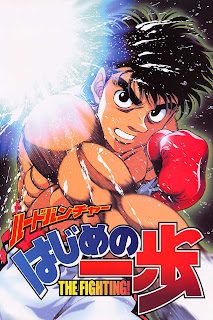Hajime No Ippo - What Is It To Be Strong?
Thoughts On: Hajime no Ippo (はじめの一歩, 2000-2002)
A reclusive high school student sets his sights on becoming a pro boxer.
Hajime no Ippo is a top tier anime; I say that without having gone through many other anime series, but having been immediately sucked into and thoroughly impressed by its first season. What immediately struck me with Hajime no Ippo was its incredible approach to narrative structure. There are two filler episodes in the 76 episode long first season that recap major championship arcs. Beyond that the plot never stops moving and characters never stop evolving. Most impressively, the vast majority of the action is in the ring; this is undoubtedly a boxing anime - a fight is what you get at every single turn. Where we aren't immersed in brilliantly impressionistic boxing matches, we are following the ever-evolving training of our characters. There are brief respites splattered throughout in which we get to learn a little of each characters' backstory or personal lives (to this point, it is the last episode that finally gives some back story to one of the biggest characters), but almost everything we get to learn about them comes from a ring or their training. This dedication to action, visually and structurally, is beyond commendable and speaks to the confidence Madhouse have in the strength of the plotting, the foundations of their characters and the spectacle of the fight sequences. Such is what I respect most in Hajime no Ippo: it retains a pure focus on boxing and Ippo's quest toward his first professional belts.
Second to its focus in narrative structure are Hajime no Ippo's unique methods in characterisation. There is no other sports, most certainly not boxing, narrative that comes to my mind that does not require bad guys. All of the genuine conflict in this series is of internal growth; the physical combat is never the means to an end, nor a motivation of the plot. The genius of this shines in the uncanny tension that is maintained across the endless fighting sequences. This is most true in the early sections of the first season: we are made to believe that anyone can win each fight. In any narrative based on combat that features a bad guy, we understand that it is the purpose of the plot to bring us toward their defeat. But, without establishing a bad guy at any turn - always humanising and presenting legitimate reasons as to why each boxer can and should win their fight - Hajime no Ippo holds you on an edge, quite ready to accept Ippo possibly losing, at its best points not even hoping that he does - simply, rather, enthralled in wait of the coming turns. This allows the fight sequences to roll on one after another with their outcome not being a focus of drama, rather it is the present moment of character development in each practice session, boxing round and between each punch. Again, this speaks to the genius of characterisation in conjunction with plotting; the journey, never the outcome, is the symbolic and impressionistic focus of the narrative, which deepens the viewing experience uniquely. We therefore are not held to tension as in a movie such as Rocky, our desire to see our hero win constantly being held at a distance before a final satisfaction. Instead, the tension in Hajime no Ippo is a personal one between audience and character, us awaiting the experience of their development, the final catharsis more a feeling of pride in their transformation rather than a relief in their success. This is why we see almost no montage sequences and never skip through parts of our characters' career deemed trivial. What is of value in this narrative is the character development across the gruelling quotidian, never the final plot point; Hajime no Ippo is less ecstatic and emotional than the likes of Rocky for this, but is far more sentimental and grounding with the audience sharing in characters' pride, not their success.
With its phenomenally unique approach to structure and character, Hajime no Ippo formulates an eloquent exploration of its characters' main question: what is it to be strong? We are given many answers across the first season that coalesce: strength is seen to be persistence under our own word that brings us beyond the obstacles impeding an endless journey. In such, strength is surmised to be like a cloud, its definition forever shifting and intangible, but nonetheless palpable in moments of triumph. The earnest evolution of who our characters are in conjunction to the presentation of genuine and relatable competitors and setbacks adds great profundity to this question and answer. It is this that elevates Hajime no Ippo far above your average sports narrative alongside its pleasantly perverted comedy and stunning animation. A tremendous 2 day binge.










